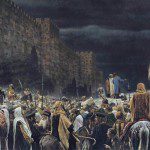
broader than the measures of the mind
I find these words arresting every time I see them. They come from an 1862 hymn by Frederick William Faber. The whole line is a striking reminder: For the love of God is broader than the measures of the mind. My brother and his friends who spend their time at play in the fields of astronomy and math and astrophysics have broad minds, indeed; they seem to be able to think in light-years and powers of ten without blowing a circuit. They’re comfortable with black holes and string theory and the notion of eleven known dimensions. But there are places even their copious minds can’t go. There, I suppose, is where mystics dwell—at the outer edge of what can be apprehended by any human instrument, or told in any human language—where even metaphors fail.
I find the idea of the unimaginable oddly comforting. Out there where imagination stops (mine somewhere this side of the boundary of an expanding universe) what one physicist called “radical amazement” begins. If we even entertain the idea that the heart of the Creator encompasses all that is, that love is that big, it becomes impossible not to imagine also that every impediment to that love will disappear in the deep space of that heart.
One of the books that kept me engaged with matters of faith in high school, where other enticements gave church some serious competition, was J.B. Phillips’ Your God is too Small. He intended it as “A Guide for Believers and Skeptics Alike.” People in both categories, he recognized, might be suffering from pinched, diminishing notions of a punitive, demanding, exclusionary, antiquated, simplistically personified God it would be impossible for an intelligent person really to worship.
“Bigger than I am” is a place to start. It may not quite get us to awe, but it can nudge us in that direction. St. Ignatius knew the imagination could help guide us to the edge where faith takes over, so he made room for imagination in his “Exercises.” David Fleming, SJ, writes of him, “the quality of thought that drove his spiritual life was his remarkable imagination.” Less bounded than rationality, imagination can go anywhere, try out “what ifs” and thought experiments, and play.
A phrase like “broader than the measures of the mind” invites us to imagine: how big would that be? I don’t know a child who hasn’t at some point stretched out both arms as wide as possible to try to get at what it means to say “I love you this much.”
If we don’t imagine such love, something in us stops growing and reaching toward the only light that can penetrate the looming darkness of this ailing planet. As we daily witness how minds can be manipulated and confused by half-truths and fears fed by calculated falsehoods, what lies beyond the measures of the mind may be exactly where we find what we need to see us through.












